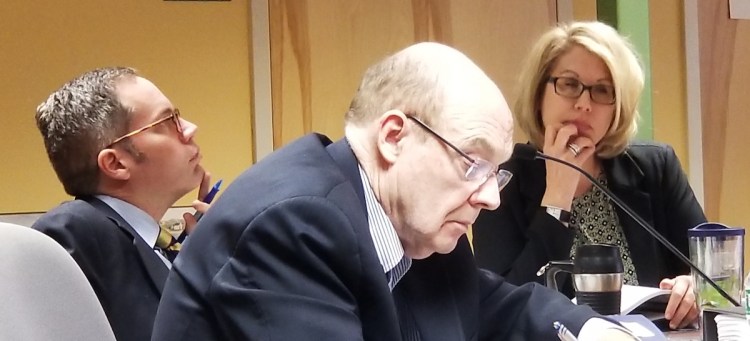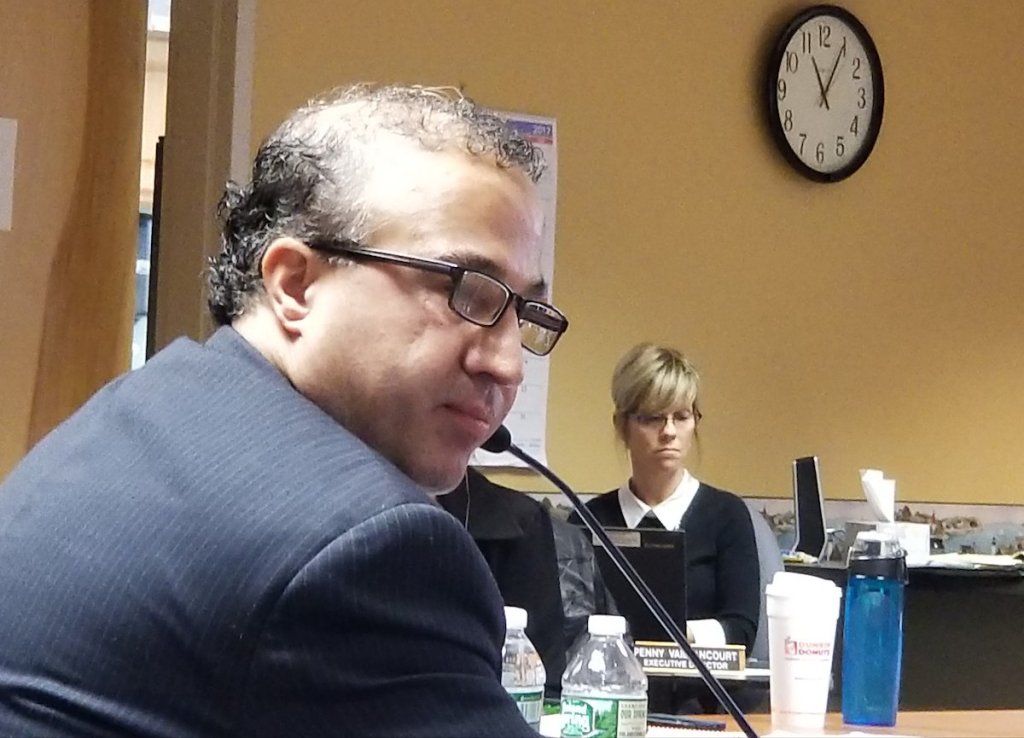AUGUSTA — The state’s case against Lewiston oral surgeon Jan Kippax is on the verge of collapse.
In a stunning move Saturday, the Maine Board of Dental Practice agreed to hit the brakes on a hearing into his competence and professionalism as it weighs the distinct possibility that the Attorney General’s Office didn’t manage to prove its case.
The decision followed seven hours of testimony by an oral surgeon from The Johns Hopkins Hospital in Baltimore whom the state hired to bolster its argument that five patients suffered at the hands of Kippax in 2015 and 2016.
Instead, the expert testified that he could not support a conclusion that Kippax had violated the rules governing his profession.
As soon as the state rested its case, Kippax’s attorney, James Belleau of Auburn, said the law requires that an expert in the field assert a violation of the standards of conduct and that the attorneys for the state never did.
“They failed,” Belleau said. “Whether you like Jan Kippax or not,” he told the five board members handling the case, it’s impossible to punish him without the support of an expert in his field.
The hearing officer on the case, Mark Terison, said it’s up to the board to make a decision on Belleau’s motion to dismiss. He said he couldn’t tell members how to vote.
“You decide credibility,” he said. Terison also said, though, they “need some expert testimony.”
State lawyers said they hope to salvage part of the case. They argued that it’s not necessary to be an expert to know that an oral surgeon who’s told to stop by panicked patients ought to step away.
Board members said they couldn’t make a decision on so weighty an issue late in the afternoon after two solid days of listening to evidence. They agreed to reconvene Friday, Dec. 1, to consider what should happen next.
What makes the move especially surprising is that the state only needed to provide evidence that it was more likely than not that Kippax had violated medical standards in dealing with the five patients who testified in September. That’s a much lower bar than the state has to meet in a criminal case, for example, where it needs to show evidence beyond a reasonable doubt.
It would still be a “he said-she said” contest – with the patients lining up on one side and Kippax and his staff on the other – except that the state’s expert didn’t wind up backing the state.
Alexander Pazoki, director of the division of oral and maxillofacial surgery and dentistry at Johns Hopkins, initially said that if the stories told by the patients were true, Kippax violated the legal standard of care for them in a number of general ways.
Under cross-examination, however, he couldn’t cite a single particular violation as Belleau led him through each of the five cases piece by piece.
In the end, Pazoki concluded there wasn’t any deviation from what’s required by law.
Given that the patients, Kippax, the dental staff and records don’t match up, he said, “These cases become a little difficult to assess.”
Belleau hailed his honesty, while Jonathan Bolton, an assistant attorney general, tried to put the best possible light on the testimony.
Bolton insisted that board members could still weigh the credibility of the patients, Kippax and two staff members who testified this weekend.
He said Pazoki, who didn’t hear all of the testimony, is “not in a position to make that credibility determination.”
“It’s a question of who the board is going to believe here,” Bolton said. “And the board needs to decide those questions on the merits.”
“There’s still an important case for the board to decide,” he said.
Board members appeared stunned that the case they’ve been dealing with since the spring of 2016 might simply vanish.
Kathryn Howard, one of the five decision-makers on the board, said the panel’s core job “is to protect the public” and she is convinced the patients’ words “have weight.”
“I don’t speak lawyer,” she said, asking for time to look into the issues involved and to read the relevant testimony and documents.
But, she said, if the state failed to make its legal point, “we don’t get to belabor it,” so it’s important to decide as soon as possible what should happen next.
During his testimony, Pazoki said he had concerns that Kippax patients who were current or former addicts might have been treated with less respect than they deserved.
“A lot of these people are easy to write off,” he said, but all ought to be judged as individuals like everyone else.
Part of Kippax’s defense has been that patients with a history of drug use are difficult to deal with because he has to use care in the medication they get.
One item that clearly bothered at least one board member was the fact that for at least three of the patients whose cases were brought against Kippax, the blood pressure and heart rates recorded on an electronic monitor at the end of their surgeries matched the levels recorded on separate discharge papers.
Rowan Morse said she is “very hung up” on that, apparently concerned that Kippax and his staff skipped a final, necessary step before letting people leave and simply used the earlier numbers. Pazoki said it is “very, very rare” to have the numbers match up as they did.
Lori Nakhan, a surgical assistant who worked for Kippax, said she always checked the blood pressure and heart rate of every patient before they were discharged.
Belleau pointed out that one of the five left before being formally discharged, short-circuiting the normal procedure. He also said there is no pending charge that Kippax failed to keep proper records.
He did say, however, that the investigation brought to light that Kippax’s assistant had failed to renew her radiology license, which she said was an oversight that did not harm any patients.
The hearing is slated to continue for two more days at the end of December if the board doesn’t end it on Dec. 1. If it does proceed, it remains unclear how long it will be until a final decision is made by the panel.
The board began investigating the five cases in early 2016. It suspended Kippax for 30 days this past February, but he regained the right to practice long before the hearing started in September.
Based on 18 complaints, the board’s former chairwoman, Dr. Geraldine Schneider of Auburn, said in a formal letter that Kippax had “demonstrated lack of skill, lack of empathy, lack of respect for his patients and lack of commitment to serving his community in a safe and caring way.”
The hearing is focused on whether the state can prove those assertions to the satisfaction of the five board members who are weighing the evidence: Dr. Lisa Howard, Dr. Stephen Morse, Dr. Glen Davis, Morse and Young.
They can rule against Kippax if they find it is more likely than not that he violated professional standards.
Belleau said, however, that it’s time to pull the plug. “We shouldn’t be here,” he said.
He assured board members that even if the case comes to a rapid and unsatisfying conclusion, his client has learned from the “unimaginable” harm he’s dealt with since his suspension last winter.
“If you don’t think Dr. Kippax has gotten the message, he has. But he has legal rights,” Belleau said.
Steve Collins can be contacted at:
scollins@sunjournal.com
Send questions/comments to the editors.



